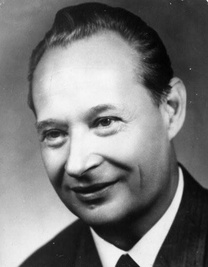
Alexander Dubcek
He was one of the main players during the 1968 Prague Spring and was a representative of the reformatory wing of the Communist Party. In 1925 he followed his parents, who were members of the Esperantist industrial cooperative Interhelpo, and went to the USSR in aid to the Soviet Kyrgyzstan, where he grew up in a socialist environment. During the Second World War he entered the Slovak resistance and lost his brother. In the 50’s he rose through the ranks of the communist hierarchy, and in 1963 he became the head of the Slovak communist branch, immediately showing strong tendencies to liberalize and renew national identity. He eventually became the leader of the Czechoslovak Communist Party, replacing Antonin Novotny in the role. His reformatory tendencies didn’t escape the watchful eye of the USSR and in the end the reaction was swift. On August 20th 1968, the country was invaded by the troops of the Warsaw pact. Dubcek, along with other members of the reformative wing, was taken to Moscow, where he was forced to sign an agreement. His time at the head of the Communist Party was officially ended. In 1989 he was the recipient of the Sakharov Prize
for Freedom of Thought. He died from the results of a serious auto accident on the D1 highway on September 1st, 1992. He was among the most respected people of the communist era, and in a certain sense he became a symbol of freedom.
1951-1555 and 1960-1968 and 1969-1970: member, and in 1969 chairman, of the National Assembly (from 1969 named Federal Assembly)
1964-1970: member of the Slovak National Committee
1955-1968: member, from 1962 member of the presidium, from 1963 first secretary, of the Central Committee of the Communist Party of Czechoslovakia
1969-1970: Czechoslovak ambassador to Turkey; during this period he received several offers for political asylum abroad, all of which he turned down, because he didn’t want to betray the confidence of the Czechoslovaks who trusted him and he didn’t want to give the normalization regime an excuse to defame him
1970: expelled from the Czech Communist Party (KSC)
1989-1992: member of VPN (Public Against Violence)
1089-1992: Chairman of the Czech Federal Assembly
1992: Chairman of SDSS (Slovak Social Democrat Party); after 1992 member of parliament representing SDSS





